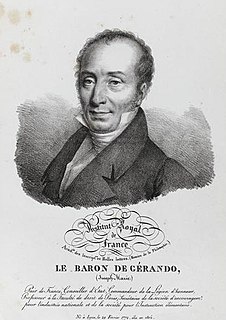A Quote by Ralph Waldo Emerson
The world is filled with the proverbs and acts and winkings of a base prudence, which is a devotion to matter, as if we possessedno other faculties than the palate, the nose, the touch, the eye and ear; a prudence which adores the Rule of Three, which never subscribes, which never gives, which seldom lends, and asks but one question of any project,--Will it bake bread?
Related Quotes
[Prudence] is the virtue of that part of the intellect [the calculative] to which it belongs; and . . . our choice of actions will not be right without Prudence any more than without Moral Virtue, since, while Moral Virtue enables us to achieve the end, Prudence makes us adopt the right means to the end.
According to the technical language of old writers, a thing and its qualities are described as subject and attributes; and thus a man's faculties and acts are attributes of which he is the subject. The mind is the subject in which ideas inhere. Moreover, the man's faculties and acts are employed upon external objects; and from objects all his sensations arise. Hence the part of a man's knowledge which belongs to his own mind, is subjective: that which flows in upon him from the world external to him, is objective.
There is no talent so useful toward rising in the world, or which puts men more out of the reach of fortune, than that quality generally possessed by the dullest sort of men, and in common speech called discretion; a species of lower prudence, by the assistance of which, people of the meanest intellectuals, without any other qualification, pass through the world in great tranquillity, and with universal good treatment, neither giving nor taking offence.
Which was first, Matter or Force? If we think on this question, we shall find that we are unable to conceive of matter without force, or force without matter. When God created the elements of which the earth is composed, He created certain wondrous forces, which are set free and become evident when matter acts on matter.
The step between prudence and paranoia is short and steep. Prudence wears a seat belt. Paranoia avoids cars. Prudence washes with soap. Paranoia avoids human contact. Prudence saves for old age. Paranoia hoards even trash. Prudence prepares and plans, paranoia panics. Prudence calculates the risk and takes the plunge. Paranoia never enters the water.
Philosophers have very justly remarked that the only solid instruction is that which the pupil brings from his own depths; that the true instruction is not that which transmits notions wholly formed, but that which renders him capable of forming for himself good opinions. That which they have said in regard to the intellectual faculties applies equally to the moral faculties. There is for the soul a spontaneous culture, on which depends all the real progress in perfection.
The great end of prudence is to give cheerfulness to those hours which splendour cannot gild, and acclamation cannot exhilarate; those soft intervals of unbended amusement, in which a man shrinks to his natural dimensions, and throws aside the ornaments or disguises which he feels in privacy to be useless incumbrances, and to lose all effect when they become familiar. To be happy at home is the ultimate result of all ambition, the end to which every enterprise and labour tends, and of which every desire prompts the prosecution.
The real secrets of Masonry are never told, not even from mouth to ear. For the real secret of Masonry is spoken to your heart and from it to the heart of your brother. Never the language made for tongue may speak it, it is uttered only in the eye in those manifestations of that love which a man has for his friend, which passeth all other loves.








































